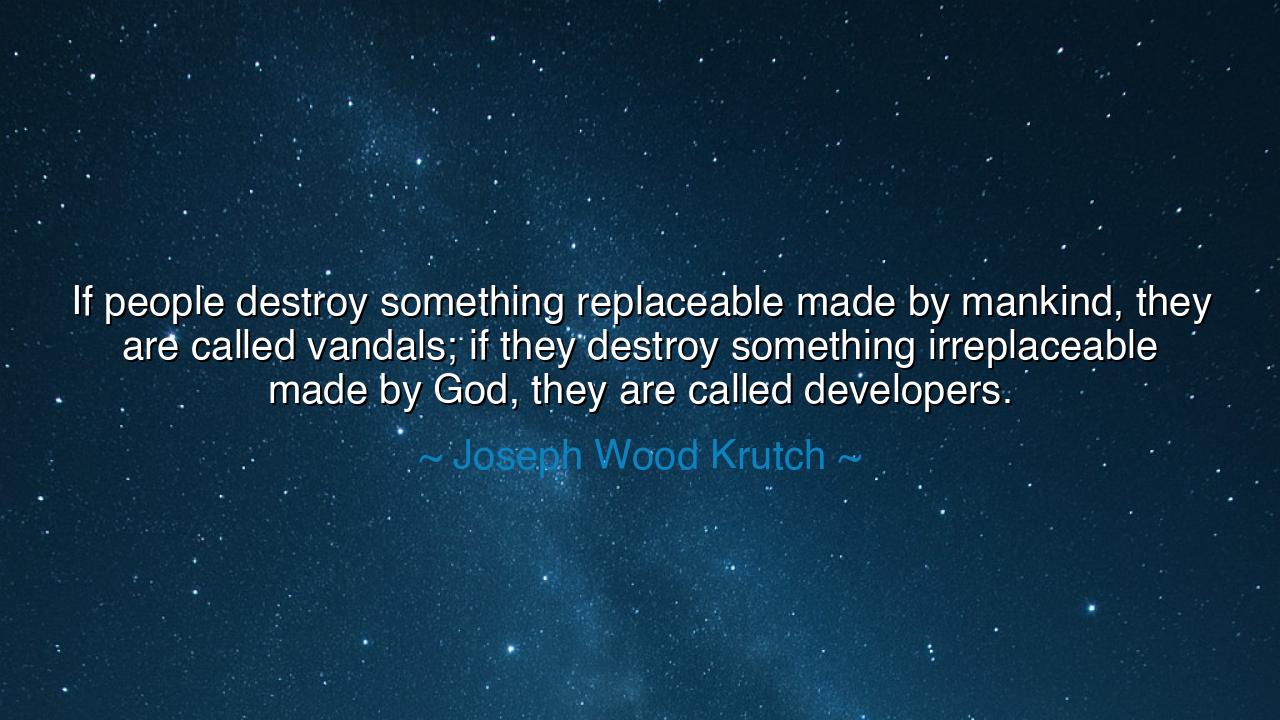
If people destroy something replaceable made by mankind, they are
If people destroy something replaceable made by mankind, they are called vandals; if they destroy something irreplaceable made by God, they are called developers.






“If people destroy something replaceable made by mankind, they are called vandals; if they destroy something irreplaceable made by God, they are called developers.” Thus spoke Joseph Wood Krutch, philosopher, naturalist, and defender of the living earth. His words strike like thunder upon the conscience of humanity. In one swift sentence, he unmasks the tragic irony of modern civilization—that men who would be condemned for defacing a statue are praised for leveling a forest; that the destroyers of nature, the very handiwork of the Divine, cloak their deeds in the noble garments of progress.
Krutch lived in an age when the wild places of the world were being consumed by industry, when rivers were harnessed by concrete and mountains were cut open for ore. He saw that mankind had come to worship the works of his own hands above the creation of God. A man who smashes a building is scorned as barbaric, yet one who paves over meadows and fills valleys with asphalt is hailed as visionary. In this inversion of values, Krutch perceived the greatest sin of modernity: that we have forgotten to revere what is irreplaceable—the living earth, the soil, the sky, the forests, the seas—and have chosen instead to adore the replaceable monuments of our own invention.
From the dawn of time, the wise have known that nature is not property but partnership. The ancients bowed to the rising sun and whispered prayers to the trees, not out of superstition, but out of gratitude. They knew that the river’s song was their own lifeblood, that the soil’s generosity sustained their breath. Yet in the modern age, this sacred bond has been severed. Man has ceased to see himself as a child of the earth and has become its master, its exploiter, its self-appointed god. Krutch’s words stand as a lament and a warning: that when we destroy the divine works of nature, we do not advance civilization—we impoverish the soul of the world.
Consider the tale of the Amazon rainforest, that vast cathedral of life stretching across the heart of South America. Within its emerald depths dwell more species than any scientist could name, and yet each year the fires of industry consume it acre by acre. The hands that wield the flame are not called vandals, but developers. They speak of economy, of necessity, of progress. But what progress can justify the death of rivers, the silencing of birds, the vanishing of a world older than mankind itself? The forest, once felled, cannot be remade by human hands; its loss is not merely ecological, but spiritual. For every tree that falls, something ancient and sacred dies within us as well.
Krutch’s insight pierces beyond the politics of conservation—it is a moral revelation. He asks us to see the hypocrisy of our reverence: that we build temples of steel and stone and call them achievements, yet the true temples of God—the mountains, the oceans, the stars—are neglected and defiled. We punish those who mar our monuments but reward those who mar creation itself. In this, we have inverted the natural order of reverence, worshipping the fleeting instead of the eternal. To restore balance, we must learn again that to protect nature is to honor the divine, and to harm it is to blaspheme against the miracle of existence.
But there is hope, for the heart of man, though misguided, is capable of remembering. Around the world rise voices—farmers who till the earth with respect, children who plant trees where none stood before, dreamers who build not by destruction but by renewal. They are the true keepers of creation, those who understand that the measure of progress is not how much we can build, but how much beauty we can preserve. The wise among us know that to be human is not to dominate the world, but to live in harmony with it.
So let this teaching be passed on as a sacred charge: Be guardians, not vandals, of what is irreplaceable. When you walk through a forest, remember you tread upon holy ground. When you drink from a river, know you partake of life itself. Build, but build gently. Develop, but never at the cost of the divine. For the works of man can be rebuilt, but the works of God—once gone—are lost forever.
And thus, the words of Joseph Wood Krutch stand as a timeless flame in the darkened halls of modern progress: “If people destroy something replaceable made by mankind, they are called vandals; if they destroy something irreplaceable made by God, they are called developers.” Remember this truth, O children of Earth, and live so that your name may be written not among the destroyers, but among the protectors—those who, through reverence and restraint, preserve the sacred harmony between man and creation.






AAdministratorAdministrator
Welcome, honored guests. Please leave a comment, we will respond soon